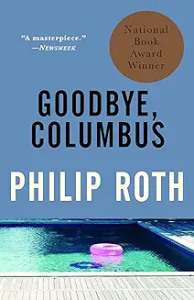Goodbye, Columbus by Philip Roth 1959
To put it quite simply, I think that Philip Roth (1933-2018) was the greatest American author writing during my lifetime. I appear to not be alone in this opinion as seen in this paragraph from Wikipedia: Roth was one of the most honored American writers of his generation.[6] He received the National Book Critics Circle award for The Counterlife, the PEN/Faulkner Award for Operation Shylock, The Human Stain, and Everyman, a second National Book Award for Sabbath’s Theater, and the Pulitzer Prize for American Pastoral. In 2001, Roth received the inaugural Franz Kafka Prize in Prague. In 2005, the Library of America began publishing his complete works, making him the second author so anthologized while still living, after Eudora Welty.[7] Harold Bloom named him one of the four greatest American novelists of his day, along with Cormac McCarthy, Thomas Pynchon, and Don DeLillo. James Wood wrote: “More than any other post-war American writer, Roth wrote the self—the self was examined, cajoled, lampooned, fictionalized, ghosted, exalted, disgraced but above all constituted by and in writing. Maybe you have to go back to the very different Henry James to find an American novelist so purely a bundle of words, so restlessly and absolutely committed to the investigation and construction of life through language… He would not cease from exploration; he could not cease, and the varieties of fiction existed for him to explore the varieties of experience.”
Several years ago I decided to both collect and read all of Roth’s work. Except for “Sabbath’s Theater”, I have read all of his novels and most of his literary criticism. The Zuckerman novels were ones I especially enjoyed, and the last four books he wrote between 2006 and 2010, the so-called “Nemeses novels” were also favorites.
I decided to re-read “Goodbye, Columbus” because it was Roth’s first book, winning him a National Book Award and because I couldn’t clearly recall the story line. Reading it brought it all back in a flash.
Neil Klugman is a 23 year old living with his Aunt Gladys and Uncle Max in Newark and working in the Newark Library when he is invited to a fancy country club by his cousin, Doris. There he is asked by a beautiful college student (Radcliffe, no less), Brenda Potemkin, to hold her glasses while she swims. Neil calls her for a date; they begin to spend all their time together, and before one can say “Hot Dog”, they are sleeping together in the Potemkin house after everyone, especially Brenda’s oversized, athletic, Ohio State football star and alum, and lover of Montovani and Kostelanitz brother, Ron are asleep. It appears that Neil is headed for the altar and a future at Potemkin Sinks (“Every size for every need”) when disaster befalls them (no spoiler, here), and the whole business comes to a sudden and sad ending.
The book is funny, sad, and brilliant, but why did it disturb me so? Why do I get uneasy over the portrayal of Jews as greedy, money-grubbing, unsophisticated members of Hadassah and the Temple (“Are you orthodox or conservative, not reformed I hope”). Do Lutherans have the same reaction when Updike portrays them as narrow-minded, rigid, uneducated small town folks in his Rabbit series? I doubt there’s that group think among them and that vulnerability to being satirized and categorized with anti-Lutheran tropes. The unease must come with being a member of a small minority which has been persecuted over centuries. Welcome to Jews in America!
Whatever the reason, I read with unease the section on the over-the-top wedding of Ron to Harriet of Milwaukee, the Potemkin Sink scene where Ron and his father ill treat the Black (in this case “Negro”) workers, and country club poolside conversations between the young wives, etc. Despite this discomfort, Roth provides us with a vivid picture of the ennui and confusion of the young adult in 1950’s America.
Read this for its stylish prose, its wonderful character portrayals, and its excruciating view of assimilating Jews in New Jersey. I found three personal elements that enriched this reading experience for me as well. First, Ron played football at OSU, the much-hated opponent of my med school alma mater, U. of Michigan. Second, Brenda’s uncle Leo who we met at the wedding was a light bulb salesman, a job that I had during med school to support my new wife and me. Finally, when Neil and Brenda have broken up, Neil walks through Harvard Yard, one of my nearly daily strolls. Time flies and great literature makes it memorable!



